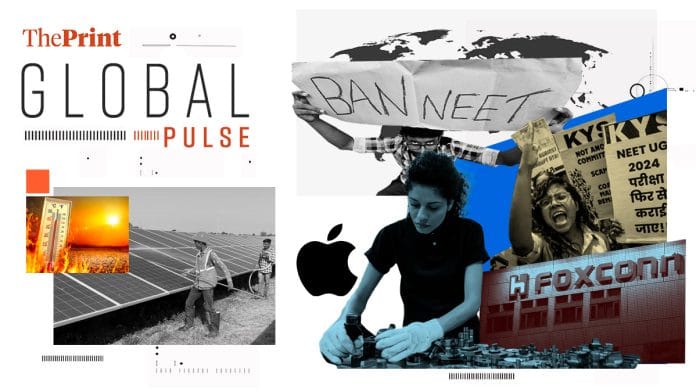New Delhi: India plans to accelerate and increase its solar panel manufacturing capacity in a bid to curb Chinese imports, reports Bloomberg based on an interview with Renewable Energy Secretary Bhupinder Singh Bhalla.
Taxes levied on Chinese components, models and manufacturers have helped boost India’s solar panel manufacturing capacity, but there’s a lot more to do, reporter Rajesh Kumar Singh writes for Bloomberg. “The nation’s cells capacity is set to jump five-fold to about 30 gigawatts a year by March 2025,” Bhalla tells Singh.
US and European officials also feel that Chinese solar companies have “overwhelmed global demand”, with the US issuing rules to “strengthen tariffs” against them, adds the report.
In Al Jazeera’s ‘Inside Story’ podcast, ‘What does India’s exam scandal mean for its students?‘, host Sami Zeidan ropes in a former president of Jawaharlal Nehru University Students’ Union, N. Sai Balaji; a senior visiting fellow at the Centre for Policy Research, Kiran Bhatty; and a senior reporter with The Wire, Sravasti Dasgupta to dissect and analyse the NEET ‘scandal’.
While trying to gauge what the NEET ‘scandal’ means for students, especially those from marginalised backgrounds, the discussion stressed the need for more seats for medical students and questioned the “centralisation” and “privatisation” of education under the Narendra Modi government. CPR’s Kiran Bhatty pointed out the imbalance between demand and supply, and the need for accountability and transparency. The Wire‘s Sravasti Dasgupta noted the “trust deficit” in the system and how such a “failure of government” is “unprecedented”, calling for a complete overhaul. N. Sai Balaji goes a little further and shares the points of view of students, calling the National Testing Agency, which conducts the NEET, the “National Trauma Agency” and accusing it of “killing the hopes of students”.
A Reuters special report exposes Apple supplier Foxconn’s systematic exclusion of married women from its iPhone assembly lines in Tamil Nadu’s Sriperumbudur, citing pregnancies, more family responsibilities and cultural markers such as jewellery. Reporters Praveen Paramasivam, Munsif Vengattil, and Aditya Kalra highlight the contradictory ambitions of big companies that employ thousands of women to play a key role in ensuring one of Modi’s imperatives — “the removal of societal impediments that prevent many Indian women from getting jobs” — while discriminating against candidates based on their marital status.
The claims were corroborated by at least 17 employees from over a dozen Foxconn hiring agencies in India and four current and former Foxconn human resources executives, as well as dozens of job advertisements by Foxconn’s third-party recruiters and their WhatsApp discussions explicitly stating the requirement for young, unmarried women. India will account for 9-14% of iPhone production globally this year as Apple looks to expand in India amid US-China tensions, but the revelations may bring forth legal challenges for the company, the report says.
“The made-in-India iPhone is promoted as a tale of female empowerment: that an army of women in Tamil Nadu is behind the world-famous devices. Yet, Reuters found there is discrimination against married women. We have been investigating this from ground zero since Jan 2023,” writes Munsi Vengattil on social media blogging site X.
Somini Sengupta in the New York Times writes that “an array of practical innovations are emerging around the world to protect people most vulnerable to its hazards”. She discusses three such innovations from across the world — a mobile app showing colour-coded levels of heat risk developed in Greece, rules for farmworkers’ protection in Washington State, US, and an “insurance” to help working women cope with the extreme heat in India’s Ahmedabad.
“The tiny insurance”, an idea by American climate finance expert Kathy Baughman McLeod, the head of the non-profit, Climate Resilience for All, allows 55-year-old Hansa Ahir, a waste recycler, to “keep going”, highlights Sengupta. The scorching heat has cut Ahir’s income by half, but now, when temperatures reach danger levels, she receives messages on her mobile phone and her insurance payments are triggered, writes Sengupta. The report says the coverage charges Rs 200 a year and 50,000 people, including market vendors, subsistence farmers, and waste recyclers, have signed up for it.
Protests turn violent Kenya, WSJ reporter faces trial in Moscow
The protests against Kenya’s new tax bill have taken a violent turn with people storming into the Parliament building Tuesday, and the police opening fire on them. Five died in police firing, according to human rights agencies. Read The Washington Post report to know more.
After 15 months in a Moscow jail, Wall Street Journal reporter Evan Gershkovich will face trial on charges of working with the CIA and collecting classified information about a Russian tank manufacturer. To know more, read this BBC report.
(Edited by Madhurita Goswami)
Also read: Indian welfare schemes only a ‘band-aid’ solution & AI players eye India’s linguistic palette






